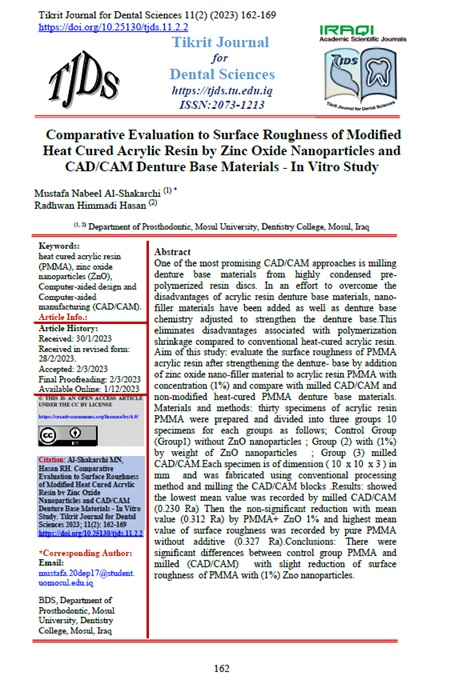Comparative Evaluation to Surface Roughness of Modified Heat Cured Acrylic Resin by Zinc Oxide Nanoparticles and CAD/CAM Denture Base Materials - In Vitro Study
Mustafa Nabeel Al-Shakarchi
Department of Prosthodontic, Mosul University, Dentistry College, Mosul, Iraq
Radhwan Himmadi Hasan
Department of Prosthodontic, Mosul University, Dentistry College, Mosul, Iraq
DOI: https://doi.org/10.25130/tjds.11.2.2
Keywords: heat cured acrylic resin (PMMA), zinc oxide nanoparticles (ZnO), Computer-aided design and Computer-aided, manufacturing (CAD/CAM).
Abstract
One of the most promising CAD/CAM approaches is milling denture base materials from highly condensed pre-polymerized resin discs. In an effort to overcome the disadvantages of acrylic resin denture base materials, nano-filler materials have been added as well as denture base chemistry adjusted to strengthen the denture base.This eliminates disadvantages associated with polymerization shrinkage compared to conventional heat-cured acrylic resin. Aim of this study: evaluate the surface roughness of PMMA acrylic resin after strengthening the denture- base by addition of zinc oxide nano-filler material to acrylic resin PMMA with concentration (1%) and compare with milled CAD/CAM and non-modified heat-cured PMMA denture base materials. Materials and methods: thirty specimens of acrylic resin PMMA were prepared and divided into three groups 10 specimens for each groups as follows; Control Group (Group1) without ZnO nanoparticles ; Group (2) with (1%) by weight of ZnO nanoparticles ; Group (3) milled CAD/CAM.Each specimen is of dimension ( 10 x 10 x 3 ) in mm and was fabricated using conventional processing method and milling the CAD/CAM blocks .Results: showed the lowest mean value was recorded by milled CAD/CAM (0.230 Ra) Then the non-significant reduction with mean value (0.312 Ra) by PMMA+ ZnO 1% and highest mean value of surface roughness was recorded by pure PMMA without additive (0.327 Ra).Conclusions: There were significant differences between control group PMMA and milled (CAD/CAM) with slight reduction of surface roughness of PMMA with (1%) Zno nanoparticles.




